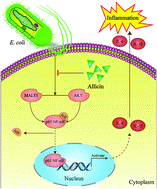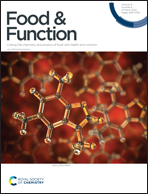Allicin suppressed Escherichia coli-induced urinary tract infections by a novel MALT1/NF-κB pathway†
Abstract
Escherichia coli (E. coli) strains cause the majority of urinary tract infections (UTIs) and are resistant to various antibiotics. Therefore, it is imperative to explore novel host-target therapies. As a famous food and condiment, garlic (Allium sativum L.) is widely used in medicine, but its exact key targets in UTIs remain elusive. To identify the major active ingredient of garlic and its molecular target against UTIs, a network pharmacology analysis was carried out, and allicin was revealed to be a key active component in garlic acting on UTIs. By molecular docking, allicin showed a good binding affinity to mucosa-associated lymphoid tissue lymphoma translocation protein 1 (MALT1). The possible regulatory mechanisms of allicin against UTIs were based on the modules of immune and inflammatory responses mainly through AKT/NF-κB signaling. Next, an E. coli-stimulated human uroepithelial cell (HUC) model was established to confirm the anti-infective effect of allicin. The results showed that allicin could significantly inhibit the upregulation of MALT1, the AKT/NF-κB pathway, and cytokines (IL-6 and IL-1β). HUCs pretreated with the PI3K inhibitor or transfected with MALT-siRNA also partly suppressed the activation of the AKT/NF-κB pathway and cytokines. Furthermore, by establishing the PCA algorithm to evaluate the therapeutic score, allicin was proved to achieve the optimal therapeutic effects compared with the PI3K inhibitor and siRNA-MALT1. Moreover, in rats with an E. coli-induced UTI model, allicin significantly alleviated the infection and up-regulation of MALT1 expression in the bladders, a marked increase in the bacterial load of urine, and deviations in serum biochemical parameters. In conclusion, allicin exerts anti-infective effects in UTIs mainly via the MALT1/NF-κB axis or AKT/NF-κB pathway, which provides a theoretical basis for understanding the function of allicin against UTIs and facilitates its clinical application.



 Please wait while we load your content...
Please wait while we load your content...